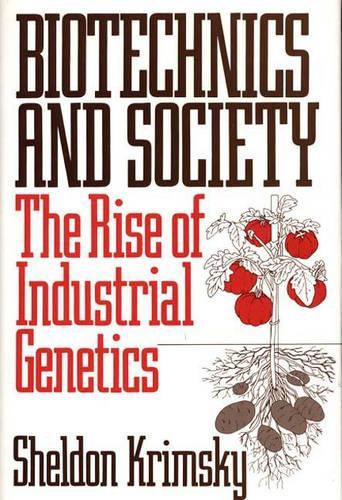
Biotechnics and Society: The Rise of Industrial Genetics
(Hardback)
Available Formats
Publishing Details
Biotechnics and Society: The Rise of Industrial Genetics
By (Author) Sheldon Krimsky
Bloomsbury Publishing PLC
Praeger Publishers Inc
10th July 1991
United States
Classifications
Tertiary Education
Non Fiction
Industry and industrial studies
303.483
Physical Properties
Hardback
280
Width 152mm, Height 229mm
652g
Description
Impacts of technological change have historically been assessed only after the passage of a significant period of time. It is then that historians recreate the decisions that were made, sort out the influencing factors, and debate in hindsight the options that were available at the time. Sheldon Krimsky, consistent with the importance of this subject, telescopes this process by providing to contemporary readers a broad overview of the first ten years of the industrial revolution in applied molecular genetics. He discusses the birth and expectations of the biotechnology industry, the response to products of genetic engineering, perspectives on risk assessment from different sectors of the scientific community, and public initiatives to regulate new products. The author explores the social and political discourse on the direction of biotechnology, and offers a detailed examination of the controversy over the environmental release of genetically engineered organisms. Finally, he takes a critical look at the conventional role of technology assessment and suggests an alternative model that fits more closely with the needs of an environmentally sensitive world.
Reviews
"Dr. Krimsky has produced a valuable book on biotechnology and society. Krimsky provides a sound analysis of the social, economic, and environmental issues related to biotechnology that should be examined before specific technologies are recommended for adoption."-David Pimentel Professor, College of Agriculture and Life Sciences Cornell University
Krimsky analyzes the biotechnology industry and its growth over the past 15 years. He is an advocate for the regulation of biotechnology, seeking to optimize its impact on both society and the environment. In the first chapter he gives his views on scientists and their impact on society, seeing them as attempting to control nature, and as promoting a mechanistic view of life. Part 1 describes the history of the biotechnology industry and some of the legal and ethical problems associated with its growth. Part 2 is devoted to the release of genetically engineered organisms, and the differing views of geneticists and ecologists on risk assessment. Part 3 discusses regulation of biotechnology. Here Krimsky argues that market forces will not prevent the misuse of biotechnology, but that a system of social controls must be emplaced to examine each use for its total effect. Useful for undergraduate or graduate students exploring the response to society of this new technology.-Choice
This is an important work by a scholar with early and sustained involvement in biotechnology issues. Krimsky is widely read and insightful in his analysis of scientific hubris and societal tensions and associated with the new molecular biology.-Rural Sociology
"This is an important work by a scholar with early and sustained involvement in biotechnology issues. Krimsky is widely read and insightful in his analysis of scientific hubris and societal tensions and associated with the new molecular biology."-Rural Sociology
"Krimsky analyzes the biotechnology industry and its growth over the past 15 years. He is an advocate for the regulation of biotechnology, seeking to optimize its impact on both society and the environment. In the first chapter he gives his views on scientists and their impact on society, seeing them as attempting to control nature, and as promoting a mechanistic view of life. Part 1 describes the history of the biotechnology industry and some of the legal and ethical problems associated with its growth. Part 2 is devoted to the release of genetically engineered organisms, and the differing views of geneticists and ecologists on risk assessment. Part 3 discusses regulation of biotechnology. Here Krimsky argues that market forces will not prevent the misuse of biotechnology, but that a system of social controls must be emplaced to examine each use for its total effect. Useful for undergraduate or graduate students exploring the response to society of this new technology."-Choice
Author Bio
SHELDON KRIMSKY is Professor of Urban and Environmental Policy at Tufts University. He is the author of Genetic Alchemy: The Social History of the Recombinant DNA Controversy and co-author of Environmental Hazards: Communicating Risks as a Social Process (Auburn House, 1988). He has published over 70 essays which have appeared in such distinguished publications as the American Journal of Public Health, The Bulletin of the Atomic Scientists, Nature, The American Scientist, and Science, Technology, and Human Values.
